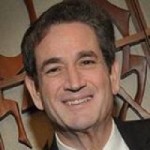By Rabbi Ben Kamin

ENCINITAS, California — Julian Bond, who has unexpectedly died at 75, did not think of civil rights as matter of color. With his distinguished baritone enunciation and meticulous choice of words, he fought for the human rights of black people, for gender equality, and like his mentor, Dr. Martin Luther King Jr., he stood stridently against the Vietnam War.
In March of 1960, Bond and King worked together and initiated a meeting on the Morehouse campus; the first Atlanta sit-in under the aegis of the “Nashville Student Movement” took place in the aftermath. The Movement eventually included the perilous “Freedom Rides” that tested and proved, against ferocious white resistance, that African Americans could ride busses and trains across interstate lines.
What struck me about Bond was that he shrewdly noticed things about people—even the ways they dress, talk, and interact. He once reminisced to me about Ella Baker, the fiery, independent, and brilliant so-called “Godmother of SNCC” (Student Non-Violent Coordinating Committee) who also helped to foster several major freedom agencies, such as the NAACP and King’s Southern Christian Leadership Conference.
Bond said that Ms. Baker did not especially trust the more senior leaders of the Movement—including even King (although King was only in his thirties in the 1960s!). Bond recalled “her warning against entanglements with adults…just to keep our movement pure. That we had started it, we had carried it forward, and we could carry it on by ourselves.”
Bond mentioned that Baker was “very regal. She always had a business suit that she’d wear—a long skirt, and it had a long jacket. She was sort of matronly in a not-dominating way. Like, ‘Don’t do that, be careful, don’t do that.’ In a very nice way, but very much like your Mom.”
Bond also intuited about the emotional undercurrents that existed some of the giants of the Civil Rights Movement. When both Rev. James Lawson and MLK spoke to protégés at one of early gatherings, “We had this real sense of friendly rivalry between Lawson and King. Not any personal animosity between them, but Lawson was like the bad younger brother pushing King to do more, to be more militant, to extend nonviolence—just to do more.”
In 1968, Julian Bond came into the national spotlight unwittingly. Just weeks after the murder of King at the Lorraine Motel, the Democratic National Convention convened in Chicago. Robert F. Kennedy had also fallen to an assassin’s bullets; the convention, dogged by nonstop protesting outside its doors and in the streets of Chicago, became an internationally broadcast tempest of anger, grief, disillusionment, and inter-generational contempt. With Bobby Kennedy gone, the delegates nominated Vice President Hubert H. Humphrey for the presidency (he would lose a close election to Richard M. Nixon in November).
Julian Bond was unexpectedly nominated for Vice President. A generation before Barack Obama, this was the first time that an African American had ever been so designated by a major political party. “I didn’t win,” he said humorously on Minnesota Public Radio in a 2008 appearance.
Bond was only 28 years old and knew that he could not accept the nomination. The Constitution requires that both the president and vice president be at least 35 years of age. He graciously withdrew but he understands that the symbolic event helped paved the way for the concept of an African American serving at the highest level of government.
Julian Bond was devastated and incensed when the news came from the balcony of the Lorraine Motel on April 4, 1968—Dr. King has been struck down. He was four hundred miles away, in Atlanta. He declared the next day: “Brotherhood was murdered in Memphis last night. Nonviolence was murdered in Memphis last night. All that is good in America was murdered in Memphis last night.”
Something else that was very good in America has now also died.
*
Rabbi Kamin is an author an freelance writer living in the San Diego suburb of Encinitas. You may contact him via ben.kamin@sdjewishworld.com